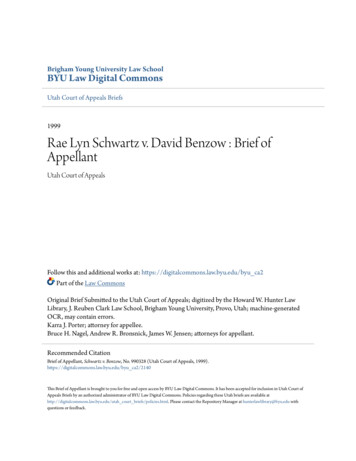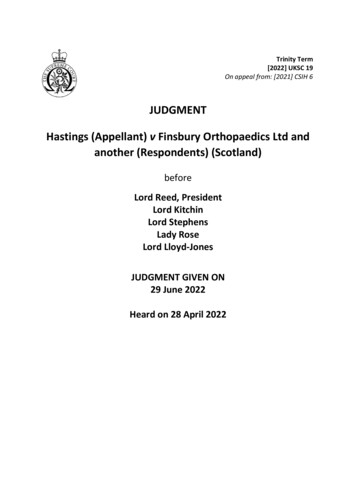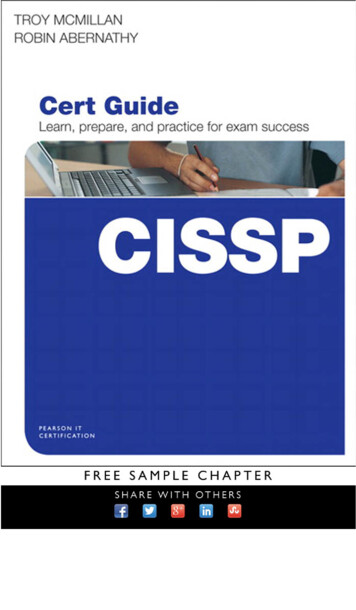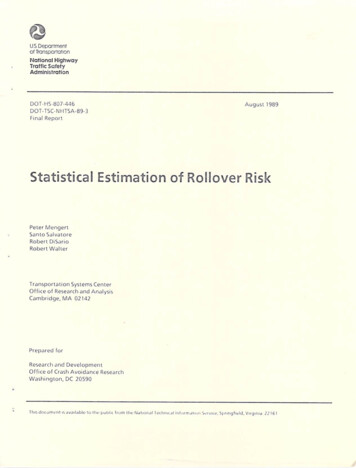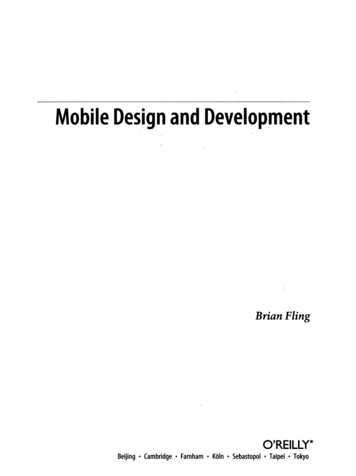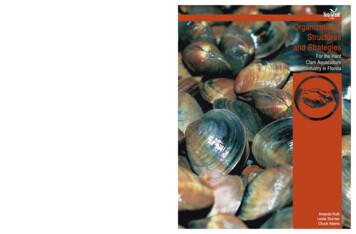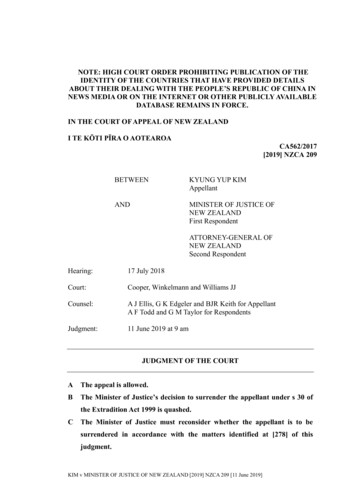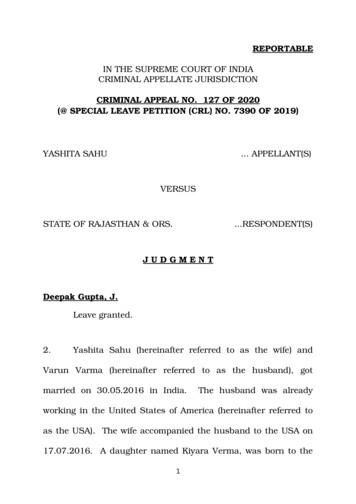
Transcription
REPORTABLEIN THE SUPREME COURT OF INDIACRIMINAL APPELLATE JURISDICTIONCRIMINAL APPEAL NO. 127 OF 2020(@ SPECIAL LEAVE PETITION (CRL) NO. 7390 OF 2019)YASHITA SAHU. APPELLANT(S)VERSUSSTATE OF RAJASTHAN & ORS.RESPONDENT(S)JUDGMENTDeepak Gupta, J.Leave granted.2.Yashita Sahu (hereinafter referred to as the wife) andVarun Varma (hereinafter referred to as the husband), gotmarried on 30.05.2016 in India.The husband was alreadyworking in the United States of America (hereinafter referred toas the USA). The wife accompanied the husband to the USA on17.07.2016. A daughter named Kiyara Verma, was born to the1
couple on 03.05.2017.She is a citizen of the USA.Therelationship between the husband and the wife got strained andthey made various allegations and counter allegations againsteach other. The wife applied for an Emergency Protection Orderon 25.08.2018 to the Norfolk Juvenile and Domestic RelationsDistrict Court (hereinafter referred to as the Norfolk Court),praying for her protection and an ex parte preliminary er,on29.08.2018, the wife instituted a petition in the same Courtseeking sole custody of the minor child. She also filed a petitionpraying that the husband be directed to give monetary support toher and the minor child. The said Court passed an order on26.09.2018 in terms of the agreement reached between theparties.This agreement is part of the order and reads asfollows: “Father to continue paying rent and utilities @ themarital residence for October, 2018 and November, 2018.Father will add mother to lease as an authorizedoccupants or leaseholder.Father to pay mother150/week for child support for October and November,2018/ and 200/week for December, 2018. Parties towork together to reach a resolution as to who willcontinue occupy the martial residence after November,2018. Mother to look for employment consistent with hereducational and professional experience. Mother andfather have joint legal custody of minor child and sharedphysical custody of child father’s parenting time to start2
Thursday September, 27, 2018 @ noon until SaturdaySeptember 29, 2018 @ noon. Thereafter, the parties areto share parenting time as follows :mother to have child every other week from Saturday @noon until Wednesday @ noon and in alternating weeksfrom Saturday @ noon until Tuesday @ noon. Fathershall have parenting time on Wednesday @ noon untilSaturday with alternating weeks two @ noon untilSaturday @ noon (i.e. 4 days on, 3 days off switchingweeks for each parent) parents shall allow whatsappcalling with child with custodial parent at least 5 min.per evening upon reasonable notice to other parent.Parents shall use a third neutral party to facilitateexchanging the child. Parties shall corporate with eachother & third party if noon exchange time is not feasibleall parties will surrender their passports, includingchild’s passport, to guardian ad liten. Mother to reside @marital residence until December 1, 2018 whereinmother will vacate the premises or assume fullresponsibility of the rent and utilities thereafter.”As per this order, amongst other things the husband was to addthe wife as an authorised lease holder in the rented premises andhe was to pay weekly support to the child @ 150 per week forthe months of October and November, 2018 and 200 per weekfor the month of December, 2018.Joint, legal custody andshared physical custody of the child was given to the parents,with each parent being given individual parenting time. As perthe agreement the child was also permitted to talk to the otherparent by WhatsApp calling, after reasonable notice.It isimportant to note that it was clearly mentioned that the partiesshall cooperate with each other and try to reach an amicable3
settlement with the help of a neutral third party. If a settlementwas not possible then they were to surrender their passportsincluding the child’s passport to the guardian ad litem. The wifewas directed to reside in the marital residence till December 1,2018, whereafter she had to vacate the premises or assume fullresponsibility of the rent and utilities.3.It is not disputed before us that the wife, along with thechild left the USA and came to India on 30.09.2018 i.e. after26.09.2018 and before 01.10.2018, which was the next date fixedbefore the Norfolk Court.4.The husband on coming to know of the fact that his wife,along with their child had left the USA for India, filed a motion foremergency relief before the Norfolk Court on 02.10.2019. An exparte order was passed in favour of the husband whereby theNorfolk Court granted sole legal and physical custody of the childto the husband and directed the wife to return to the USA alongwith the child. A warrant was also issued against the wife forviolating the order dated 26.09.2018 of the Norfolk Court.5.The husband also filed a petition for issuance of a writ ofhabeas corpus before the Rajasthan High Court for production of4
his minor child.The High Court by the impugned judgmentdated 01.07.2019 directed the wife to return to the USA alongwith her minor daughter within a period of 6 weeks to enable thejurisdictional court in USA to pass further orders in this regardin the proceedings already pending. The husband was directedto make all arrangements for the stay and travel of the wife andthe minor child and any companion. It was further directed thatin case the wife was not willing to stay in the house of thehusband, then the petitioner husband would make alternativearrangements for her stay at the place of her choice at areasonable cost.6.Aggrieved by this judgment of the Rajasthan High Court,the wife has filed the present appeal.7.We have heard Ms. Malvika Rajkotia, learned counsel forthe appellant and Mr. Prabhjit Jauhar, learned counsel for therespondents, at length.Various contentions have been raisedbefore us by both sides. It has been contended by Ms. Rajkotiathat a writ of habeas corpus would not lie for the custody of thechild since she could not be said to be in illegal detention, as thechild was in the custody of the mother who is the natural5
guardian. She also contended that the High Court erred in givinga direction to the wife to travel to the USA. Her next contentionis that the child is only about 2 ½ years old and moreover being agirl child requires the care, attention and protection of themother and, therefore, it is in the interest of the child to beplaced in custody of the mother. With regard to the proceedingsbefore the Norfolk Court in the USA, it is contended that the wifewas unable to comprehend the proceedings before the NorfolkCourt because of lack of knowledge of English and that toospoken in an American accent. She also submitted that the legalaid provided to the wife was of a lawyer who was a ‘caucasianmale’, implying that there was lack of communication betweenthe two. It is also contended that the wife had raised objection tothe alleged consent order vide e mail dated 28.09.2018. She alsosubmits that the order passed by the Norfolk Court is not bindingon the parties, especially the wife and, in the larger interest of thechild the writ petition filed by the husband before the RajasthanHigh Court should have been dismissed. It was also contendedby Ms. Rajkotia that the husband is working in the USA on thebasis of a work permit which is only valid till 2020 and the future6
of the wife and the child will be in jeopardy in case his visa/workpermit is not extended.8.On the other hand, Mr. Jauhar, contends that it was thewife who approached the Court in Norfolk and, by agreement, anorder was passed giving shared parenting to both the parents.The wife had been specifically directed neither to leave the USAnor take the child out of the USA, but she has violated the ordersof the jurisdictional court, which jurisdiction was invoked by thewife herself. According to him the wife cannot be permitted toviolate the orders passed by a court in another country and thenseek protection in the Indian courts. He also submitted that inthis modern age it is a well recognised principle of parenting thateven a father can be an appropriate natural guardian for theminor daughter. Lastly, he submitted that the husband is notinterested in divorcing the wife and his intention is to live withthe child and the wife. He also urged that the husband is willingto make all arrangements for stay and travel for the wife and thechild, if the wife comes to the USA along with the child.Whether a writ of habeas corpus is maintainable?7
9.It is too late in the day to urge that a writ of habeascorpus is not maintainable if the child is in the custody ofanother parent. The law in this regard has developed a lot over aperiod of time but now it is a settled position that the court caninvoke its extraordinary writ jurisdiction for the best interest ofthe child.This has been done in Elizabeth Dinshaw vs.Arvand M. Dinshaw & Ors.1, Nithya Anand Raghavan vs.State (NCT of Delhi) & Anr. 2 and Lahari Sakhamuri vs.Sobhan Kodali3 among others. In all these cases the writpetitions were entertained. Therefore, we reject the contention ofthe appellant wife that the writ petition before the High Court ofRajasthan was not maintainable.10.We need not refer to all decisions in this regard but itwould be apposite to refer to the following observations from thejudgment in Nithya Anand Raghavan (supra): “46. The High Court while dealing with the petition forissuance of a writ of habeas corpus concerning a minorchild, in a given case, may direct return of the child ordecline to change the custody of the child keeping inmind all the attending facts and circumstances includingthe settled legal position referred to above. Once again,we may hasten to add that the decision of the court, in1 (1987) 1 SCC 422 (2017) 8 SCC 4543 (2019) 7 SCC 3118
each case, must depend on the totality of the facts andcircumstances of the case brought before it whilstconsidering the welfare of the child which is ofparamount consideration. The order of the foreign courtmust yield to the welfare of the child. Further, the remedyof writ of habeas corpus cannot be used for mereenforcement of the directions given by the foreign courtagainst a person within its jurisdiction and convert thatjurisdiction into that of an executing court. Indubitably,the writ petitioner can take recourse to such otherremedy as may be permissible in law for enforcement ofthe order passed by the foreign court or to resort to anyother proceedings as may be permissible in law before theIndian Court for the custody of the child, if so advised.47. In a habeas corpus petition as aforesaid, the HighCourt must examine at the threshold whether the minoris in lawful or unlawful custody of another person(private Respondent named in the writ petition) ”11.Further, in the case of Kanika Goel vs. State of Delhi4, itwas held as follows:“34. As expounded in the recent decisions of this Court,the issue ought not to be decided on the basis of rights ofthe parties claiming custody of the minor child but thefocus should constantly remain on whether the factum ofbest interest of the minor child is to return to the nativecountry or otherwise. The fact that the minor child willhave better prospects upon return to his/her nativecountry, may be a relevant aspect in a substantiveproceedings for grant of custody of the minor child butnot decisive to examine the threshold issues in a habeascorpus petition. For the purpose of habeas corpuspetition, the Court ought to focus on the obtainingcircumstances of the minor child having been removedfrom the native country and taken to a place to encounteralien environment, language, custom, etc. interfering withhis/her overall growth and grooming and whethercontinuance there will be harmful ”4 (2018) 9 SCC 5789
12.In the present case since the wife brought the minor toIndia in violation of the orders of the jurisdictional court in USA,her custody of the child cannot be said to be strictly legal.However, we agree with the learned counsel for the appellant thatthe High Court could not have directed the appellant wife to go tothe USA. The wife is an adult and no court can force her to stayat a place where she does not want to stay. Custody of a child isa different issue, but even while deciding the issue of custody of achild, we are clearly of the view that no direction can be issued tothe adult spouse to go and live with the other strained spouse inwrit jurisdiction.Comity of Courts13.In the fast shrinking world where adults marry and shiftfrom one jurisdiction to another there are increasing issues ofjurisdiction as to which country’s courts will have jurisdiction. Inmany cases the jurisdiction may vest in two countries. The issueis important and needs to be dealt with care and sensitivity.Though the interest of the child is extremely important and is, infact, of paramount importance, the courts of one jurisdictionshould respect the orders of a court of competent jurisdiction10
even if it is beyond its territories. When a child is removed byone parent from one country to another, especially in violation ofthe orders passed by a court, the country to which the child isremoved must consider the question of custody and decidewhether the court should conduct an elaborate enquiry on thequestion of child’s custody or deal with the matter summarily,ordering the parent to return the custody of the child to thejurisdiction from which the child was removed, and all aspectsrelating to the child’s welfare be investigated in a court in his/herown country.14.Reference in this regard may be made to the judgment inElizabeth Dinshaw (supra) wherein this Court was dealing witha case where the wife was an American citizen whereas thehusband was a citizen of India. They got married in America anda child was born to them in the year 1978. In 1980, differencesarose between the couple and the wife filed a petition for divorce.The jurisdictional court in America had dissolved the marriage bya decree of divorce on 23.04.1982 and by the same decree it wasdirected that the wife would have the care, custody and control ofthe child till he reaches the age of 18 years. The husband was11
given visitation rights.Taking advantage of the weekendvisitation rights, the husband picked up the child from school on11.01.1986 and brought him to India. The wife filed a petitionunder Article 32 of the Constitution of India before this Court.Not only was the petition entertained, but the same was allowedand we would like to refer to certain important observations ofthis Court in Para 8:“8. Whenever a question arises before a court pertainingto the custody of a minor child, the matter is to bedecided not on considerations of the legal rights of partiesbut on the sole and predominant criterion of what wouldbest serve the interest and welfare of the minor. We havetwice interviewed Dustan in our chambers and talkedwith him. We found him to be too tender in age andtotally immature to be able to form any independentopinion of his own as to which parent he should staywith. The child is an American citizen. Excepting for thelast few months that have elapsed since his beingbrought to India by the process of illegal abduction by thefather, he has spent the rest of his life in the UnitedStates of America and he was doing well in school there.In our considered opinion it will be in the best interestsand welfare of Dustan that he should go back to theUnited States of America and continue his educationthere under the custody and guardianship of the motherto whom such custody and guardianship have beenentrusted by a competent court in that country. We arealso satisfied that the petitioner who is the mother, is fullof genuine love and affection for the child and she can besafely trusted to look after him, educate him and attendin every possible way to his proper upbringing. The childhas not taken root in this country and he is stillaccustomed and acclimatized to the conditions andenvironments obtaining in the place of his origin in theUnited States of America. The child’s presence in India isthe result of an illegal act of abduction and the fatherwho is guilty of the said act cannot claim any advantageby stating that he has already put the child in some12
school in Pune. The conduct of the father has not beensuch as to inspire confidence in us that he is a fit andsuitable person to be entrusted with the custody andguardianship of the child for the present.”In V. Ravi Chandran (Dr.) (2) vs. Union of India (UOI) andOrs.5 it was held as follows:“29. While dealing with a case of custody of a childremoved by a parent from one country to another incontravention of the orders of the court where the partieshad set up their matrimonial home, the court in thecountry to which child has been removed must firstconsider the question whether the court could conductan elaborate enquiry on the question of custody or bydealing with the matter summarily order a parent toreturn custody of the child to the country from which thechild was removed and all aspects relating to child'swelfare be investigated in a court in his own country.Should the court take a view that an elaborate enquiry isnecessary, obviously the court is bound to consider thewelfare and happiness of the child as the paramountconsideration and go into all relevant aspects of welfare ofchild including stability and security, loving andunderstanding care and guidance and full development ofthe child's character, personality and talents. While doingso, the order of a foreign court as to his custody may begiven due weight; the weight and persuasive effect of aforeign judgment must depend on the circumstances ofeach case.30. However, in a case where the court decides toexercise its jurisdiction summarily to return the child tohis own country, keeping in view the jurisdiction of thecourt in the native country which has the closest concernand the most intimate contact with the issues arising inthe case, the court may leave the aspects relating to thewelfare of the child to be investigated by the court in hisown native country as that could be in the best interest ofthe child .”5 (2010) 1 SCC 17413
15.In Nithya Anand Raghavan (supra), this Court took thefollowing view: “42. The consistent view of this Court is that if the childhas been brought within India, the courts in India mayconduct: (a) summary inquiry; or (b) an elaborate inquiryon the question of custody. In the case of a summaryinquiry, the court may deem it fit to order return of thechild to the country from where he/she was removedunless such return is shown to be harmful to the child.In other words, even in the matter of a summary inquiry,it is open to the court to decline the relief of return of thechild to the country from where he/she was removedirrespective of a pre existing order of return of the childby a foreign court. In an elaborate inquiry, the court isobliged to examine the merits as to where the paramountinterests and welfare of the child lay and reckon the factof a pre existing order of the foreign court for return ofthe child as only one of the circumstances. In either case,the crucial question to be considered by the court (in thecountry to which the child is removed) is to answer theissue according to the child’s welfare. That has to be donebearing in mind the totality of facts and circumstances ofeach case independently. Even on close scrutiny of theseveral decisions pressed before us, we do not find anycontra view in this behalf. To put it differently, theprinciple of comity of courts cannot be given primacy ormore weightage for deciding the matter of custody or forreturn of the child to the native State.”Thereafter, another bench of this Court in Lahari Sakhamuri(supra), while interpreting the judgment in Nithya AnandRaghavan (supra) held as follows : “41 the doctrines of comity of courts, intimate connect,orders passed by foreign courts having jurisdiction in thematter regarding custody of the minor child, citizenshipof the parents and the child etc., cannot override theconsideration of the best interest and the welfare of thechild and the direction to return the child to the foreign14
jurisdiction must not result in any physical, mental,psychological, or other harm to the child.”16.We are of the considered view that the doctrine of comityof courts is a very healthy doctrine. If courts in differentjurisdictions do not respect the orders passed by each other itwill lead to contradictory orders being passed in differentjurisdictions. No hard and fast guidelines can be laid down inthis regard and each case has to be decided on its own facts. Wemay however again reiterate that the welfare of the child willalways remain the paramount consideration.Welfare of the child – the paramount consideration17.It is well settled law by a catena of judgments that whiledeciding matters of custody of a child, primary and paramountconsideration is welfare of the child.If welfare of the child sodemands then technical objections cannot come in the way.However, while deciding the welfare of the child it is not the viewof one spouse alone which has to be taken into consideration.The courts should decide the issue of custody only on the basisof what is in the best interest of the child.15
18.The child is the victim in custody battles. In this fight ofegos and increasing acrimonious battles and litigations betweentwo spouses, our experience shows that more often than not, theparents who otherwise love their child, present a picture as if theother spouse is a villain and he or she alone is entitled to thecustody of the child. The court must therefore be very vary ofwhat is said by each of the spouses.19.A child, especially a child of tender years requires thelove, affection, company, protection of both parents. This is notonly the requirement of the child but is his/her basic humanright. Just because the parents are at war with each other, doesnot mean that the child should be denied the care, affection, loveor protection of any one of the two parents. A child is not aninanimate object which can be tossed from one parent to theother.Every separation, every re union may have a traumaticand psychosomatic impact on the child. Therefore, it is to beensured that the court weighs each and every circumstance verycarefully before deciding how and in what manner the custody ofthe child should be shared between both the parents. Even if thecustody is given to one parent the other parent must have16
sufficient visitation rights to ensure that the child keeps in touchwith the other parent and does not lose social, physical andpsychological contact with any one of the two parents. It is onlyin extreme circumstances that one parent should be deniedcontact with the child. Reasons must be assigned if one parent isto be denied any visitation rights or contact with the child.Courts dealing with the custody matters must while decidingissues of custody clearly define the nature, manner and specificsof the visitation rights.20.The concept of visitation rights is not fully developed inIndia. Most courts while granting custody to one spouse do notpass any orders granting visitation rights to the other spouse. Asobserved earlier, a child has a human right to have the love andaffection of both the parents and courts must pass ordersensuring that the child is not totally deprived of the love,affection and company of one of her/his parents.21. Normally, if the parents are living in the same town or area,the spouse who has not been granted custody is given visitationrights over weekends only. In case the spouses are living at adistance from each other, it may not be feasible or in the interestof the child to create impediments in the education of the child17
by frequent breaks and, in such cases the visitation rights mustbe given over long weekends, breaks, and holidays. In cases likethe present one where the parents are in two different continentseffort should be made to give maximum visitation rights to theparent who is denied custody.22. In addition to ‘Visitation Rights’, ‘Contact rights’ are alsoimportant for development of the child specially in cases whereboth parents live in different states or countries. The concept ofcontact rights in the modern age would be contact by telephone,e mail or in fact, we feel the best system of contact, if availablebetween the parties should be video calling. With the increasingavailability of internet, video calling is now very common andcourts dealing with the issue of custody of children must ensurethat the parent who is denied custody of the child should be ableto talk to her/his child as often as possible. Unless there arespecial circumstances to take a different view, the parent who isdenied custody of the child should have the right to talk tohis/her child for 5 10 minutes everyday. This will help inmaintaining and improving the bond between the child and theparent who is denied custody.If that bond is maintained thechild will have no difficulty in moving from one home to another18
during vacations or holidays. The purpose of this is, if we cannotprovide one happy home with two parents to the child then letthe child have the benefit of two happy homes with one parenteach.23.As far as the present case is concerned, keeping in viewwhat we have held above, we are not going into variousallegations and counter allegations made by both the spouses.However, we record the statement of the husband that he has nointention of divorcing his wife. We can only hope that the couplecan either by themselves or through mediation settle theirdisputes which would not only be in their own interest but alsoin the interest of Kiyara. Having said so, since at this stage thedispute between them remains unresolved we shall list out thefactors and weigh them in a proper manner to see what is best inthe interest of the child: 24.Age of the child – the child is less than 3 years old. Sheis a girl and, therefore, there can be no manner of doubt that sheprobably requires her mother more than her father.factor in favour of the wife.19This is a
25.Nationality of the child The child is a citizen of USA bybirth. Her father was already working in the USA when he gotmarried. We are told that the mother had visited the USA oncebefore marriage and when she got married it was done with theknowledge that she may have to settle down there. The child wasborn in a hospital in the USA and the mother did not come backto India for delivery which indicates that at that time the parentswanted the child to be a citizen of USA.Since the child is acitizen of USA by birth and holds a passport of that country,while deciding the issue of custody we have to take this factorinto consideration.26.Proceedings in the Norfolk Court It is the wife whoapproached the court of competent jurisdiction, i.e. NorfolkJuvenile and Domestic Relations District Court, in the USA. Shefirst applied for an emergency order and also instituted a petitionseeking sole legal and physical custody of the child.After thehusband put in appearance on the basis of the agreement, aconsent order was passed which directed both the parties to livein the matrimonial home till 01.12.2018. It further directed thatif the matter could not be settled by that date then the wife would20
make her own arrangements for residence etc.Provision wasalso made for shared parenting. The wife in total violation of thesaid order brought the child back to India.27.We are not in agreement with the contention raised onbehalf of the wife that she could not understand the order ofthe Norfolk Court. This is not the first time that the wife hadapproached the court. The wife is educated. She was workingin Walmart in the USA.She had contacted an NGO and on09.09.2017anhadsente mailDepartment against her husband.toParsipannyPoliceOn 03.05.2018, thehusband obtained an emergency protection order against thewife.Thereafter, the wife along with the minor daughterreturned to India on 16.05.2018 and went back to the USA on16.07.2018. The complaint filed by the husband is said to havebeen dismissed on 26.07.2018. On 25.08.2018 the wife calledthe Police as according to her she was scared for her safety andthat of her minor daughter. According to her she applied for anemergency protective order on 25.08.2018 which was passed inher favour. The wife also instituted a petition seeking sole legaland physical custody of the minor child before the Norfolk21
Court on 29.08.2018.passed.On 26.09.2018 the consent order wasIt would also be pertinent to mention that evenaccording to the wife she had been sending e mails to theIndian Embassy in Washington for help. The wife also ich,according to her is a nutrition programme to help low incomeAmericans to put food on the table.28.The wife is aware of her rights. She has been taking thehelp of the Police, Magistrate, the Domestic Court and FederalProgrammes, when the need arose. She was also working withWalmart and we are unable to accept her contention thatbecause of lack of translator she could not understand whatwas happening.We are also unable to agree with thecontention now raised that her counsel coerced her to enterinto the agreement. In any event if she has any grievance withregard to the manner in which the settlement was arrived at,the proper course was to raise the issue before the NorfolkCourt. No Indian Court can sit in appeal over the orders of theNorfolk Court. We are clearly of the view that the plea she has22
set up is only to justify her patent violation of the orders of theNorfolk Court.29.Obviously, the child who is less than three years old cannotbe heard in the matter but keeping in view the facilities ofeducation, social security etc., which would be available in USA,we are of the view that the child should
Indian Court for the custody of the child, if so advised. 47. In a habeas corpus petition as aforesaid, the High Court must examine at the threshold whether the minor is in lawful or unlawful custody of another person (private Respondent named in the writ petition) " 11. Further, in the case of Kanika Goel vs. "
